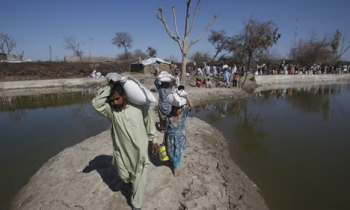It seems to be a race for setting dubious records. With the killing of two journalists within a span of 60 hours in the Philippines, the country in a neck-and-neck battle with Bangladesh has zoomed ahead. It is the most murderous place for a journalist to be in outside of Iraq.

Robert Ramos, a reporter for the tabloid Katapat based in Laguna, was killed by two gunmen around 8 pm on November 20 in front of a market in barangay Looc, Cabuyao town, Laguna. Ramos had been exposing illegal activities including gambling and prostitution through his newspaper.
Ramos was the 72nd Filipino journalist to be murdered since 1986, and the 35th journalist to be killed since President Gloria Macapagal Arroyo took over in January 2001, the 9th journalist to be murdered this year, and the 2nd in less than 60 hours, the National Union of Journalists of the Philippines (NJUP) has said.
Ricardo "Ding" Uy, a radio announcer of DZRS-AM in Sorsogon City, was gunned down outside his home on Friday November 18. Uy was shot five times in the head, torso and mouth with a .45 calibre pistol at approximately 11am by a lone attacker on a motorcycle. Uy was a radio announcer for DZRS-AM in Sorsogon City and president of the Media Reporters Association of the province and a Bayan Muna provincial coordinator for Sorsogon.
"These recent deaths are further evidence of the incredibly dangerous environment that journalists work within in the Philippines, " said Christopher Warren, president of the International Federation of Journalists (IFJ). "It is inexcusable and incomprehensible that this level of violence against journalists is allowed to continue. The government of President Arroyo must take immediate and decisive action and bring an end to this violence," said Warren.
While the NUJP is still trying to determine the circumstances behind Ramos's killing, the union felt that his murder underscores the continuing danger being faced by journalists in the Philippines, particularly those in the provinces, where most of the killings of journalists take place.
NUJP said the fact that Ramos's murder occurred amid the never-ending violence and intimidation of journalists should be of utmost concern to the media community, to the public, but most especially to the authorities, particularly President Arroyo.
The union flayed Arroyo, "The President likes to boast � without basis, we must point out – that, on one hand, her administration has done much to protect press freedom. On the other hand, she has no qualms about labelling the media as "bad boys," even going to the extent of unfairly and erroneously accusing journalists of being terrorist-coddlers.
"She also pushes for legislations, the anti-terrorism bill particularly, which has dire implications not only for civil liberties but also for press freedom. These would be unmatched and unprecedented even by the brutal standards of the Marcos dictatorship. We urge the President and the police to drop their self-serving rhetoric and work genuinely and resolutely for the arrest, prosecution and punishment of killers of journalists."
In April this year, the IFJ released a report into the alarming number of journalists being killed in the Philippines, concluding that a culture of violence, encouraged by government inaction, was the main reason for the murders of 66 journalists (i.e. till April) there since 1986.
"This report puts the Government of Philippines on notice: the world is watching," Warren had said releasing the report. "The Government of President Arroyo must halt the bloodshed of our colleagues and the citizens of the Philippines," he said.

The IFJ report was thre sult of a factfinding mission to the Philippines led by senior Australian journalist Gerard Noonan and including Rustam F Mandayun, from Tempo in Indonesia; Inday Espina-Varona, chairperson, NUJP; Carlos Conde, secretary general, NUJP; Rowena Carranza-Paraan, a director, NUJP; Diosa Labiste, a director, NUJP and May Rodriguez, treasurer, NUJP.
The mission was prompted by the Philippines attaining the dubious honour of featuring second only to Iraq as the most deadly place for journalists to work, with it taking out the second spot on the IFJ's 2004 journalists and media workers killed list.
Among other things that were highlighted in the report:
- Tolerance of a culture of violence involving senior Government officials is responsible for the high death toll.
- Journalists meagre wages put journalists at risk through the use of the 'block time' system in radio.
- The impracticality and dangerous nature of the witness protection program resulting in the murder of one witness has contributed to the lack of cases being brought to trial.
- The gun culture � turning journalists into combatants � is contributing to the escalating violence directed towards journalists.
In the report, the IFJ recommended:
- Establishment of a safety office to develop and deliver training programs on ethics, human rights, self-protection and how to cover hostile regions to journalists in the Philippines.
- Expand Task Force Newsmen, a body set up by President Arroyo, to include non-governmental organisations and to effectively investigate the (66) cases of journalists killed since 1986.
- The international community to lobby the Philippines Government and judiciary to successfully prosecute the (66) cases.
- The Philippines employer organisations adopt a code of conduct.
- A review the practice of 'block time' radio payments, where journalists buy time on local radio.
- The Philippines Government to promote an appropriate public grievance procedure to deal with complaints against the media.
- Translation of the IFJ's safety handbook Live News: A Survival Guide for Journalists into Tagalog.
"By speaking to the families and employers of the slain journalists in the Philippines, as well as to regional officials we have gained an understanding of the factors that contributed to these tragic deaths," said Gerard Noonan, head of IFJ delegation to the Philippines. "We believe that the information in the report will highlight the extreme challenges Filipino journalists are currently facing. We hope this will strengthen the resolve of the world's media to support the fight against these unacceptable levels of repression," said Noonan.









